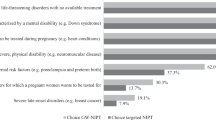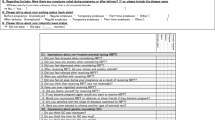Abstract
The purpose of this study is to summarize the results from a survey on awareness of genetic counseling for pregnant women who wish to receive non-invasive prenatal testing (NIPT) in Japan. As a component of a clinical study by the Japan NIPT Consortium, genetic counseling was conducted for women who wished to receive NIPT, and a questionnaire concerning both NIPT and genetic counseling was given twice: once after pre-test counseling and again when test results were reported. The responses of 7292 women were analyzed. They expressed high satisfaction with the genetic counseling system of the NIPT Consortium (94%). The number of respondents who indicated that genetic counseling is necessary for NIPT increased over time. Furthermore, they highly valued genetic counseling provided by skilled clinicians, such as clinical geneticists or genetic counselors. The vast majority (90%) responded that there was sufficient opportunity to consider the test ahead of time. Meanwhile, women who received positive test results had a poor opinion and expressed a low-degree satisfaction. We confirmed that the pre-test genetic counseling that we conducted creates an opportunity for pregnant women to sufficiently consider prenatal testing, promotes its understanding and has possibilities to effectively facilitate informed decision making after adequate consideration. A more careful and thorough approach is considered to be necessary for women who received positive test results.
Similar content being viewed by others
Log in or create a free account to read this content
Gain free access to this article, as well as selected content from this journal and more on nature.com
or
References
Chervenak, F. A. & McCullough, L. B. Ethical issues in perinatal genetics. Semin. Fetal Neonatal. Med. 16, 70–73 (2011).
Hertig, S. G., Cavalli, S., Burton-Jeangros, C. & Elger, B. S. 'Doctor, what would you do in my position?' Health professionals and the decision-making process in pregnancy monitoring. J. Med. Ethics 40, 310–314 (2014).
Godino, L. et al. Attitudes of women of advanced maternal age undergoing invasive prenatal diagnosis and the impact of genetic counselling. Eur. J. Hum. Genet. 24, 331–337 (2015).
Tabor, A. & Alfirevic, Z. Update on procedure-related risks for prenatal diagnosis techniques. Fetal Diagn. Ther. 27, 1–7 (2010).
Akolekar, R., Beta, J., Picciarelli, G., Ogilvie, C. & D'Antonio, F. Procedure-related risk of miscarriage following amniocentesis and chorionic villus sampling: a systematic review and meta-analysis. Ultrasound Obstet. Gynecol. 45, 16–26 (2015).
Tiller, G. E., Kershberg, H. B., Goff, J., Coffeen, C., Liao, W. & Sehnert, A. J. Women's views and the impact of noninvasive prenatal testing on procedures in a managed care setting. Prenat. Diagn. 35, 428–433 (2014).
Alexander, E., Kelly, S. & Kerzin-Storrar, L. Non-invasive prenatal testing: UK genetic counselors' experiences and perspectives. J. Genet. Couns. 24, 300–311 (2014).
Benn, P., Chapman, A. R., Erickson, K., Defrancesco, M. S., Wilkins-Haug, L., Egan, J. F. et al. Obstetricians and gynecologists' practice and opinions of expanded carrier testing and noninvasive prenatal testing. Prenat. Diagn. 34, 145–152 (2014).
Buchanan, A., Sachs, A., Toler, T. & Tsipis, J. NIPT: current utilization and implications for the future of prenatal genetic counseling. Prenat. Diagn. 34, 850–857 (2014).
Mennuti, M. T., Cherry, A. M., Morrissette, J. J. & Dugoff, L. Is it time to sound an alarm about false-positive cell-free DNA testing for fetal aneuploidy? Am. J. Obstet. Gynecol 209, 415–419 (2013).
Yotsumoto, J., Sekizawa, A., Koide, K., Purwosunu, Y., Ichizuka, K., Matsuoka, R. et al. Attitudes toward non-invasive prenatal diagnosis among pregnant women and health professionals in Japan. Prenat. Diagn. 32, 674–679 (2012).
Wax, J. R., Cartin, A., Chard, R., Lucas, F. L. & Pinette, M. G. Noninvasive prenatal testing: Impact on genetic counseling, invasive prenatal diagnosis, and trisomy 21 detection. J. Clin. Ultrasound 43, 1–6 (2014).
American College of Obstetricians and Gynecologists Committee on Genetics. Committee Opinion No. 545: noninvasive prenatal testing for fetal aneuploidy. Obstet Gynecol 120, 1532–1534 (2012).
Wilson, K. L., Czerwinski, J. L., Hoskovec, J. M., Noblin, S. J., Harbison, A., Singletary, C. N. et al. NSGC practice guideline: prenatal screening and diagnostic testing options for chromosome aneuploidy. J. Genet. Couns. 22, 4–15 (2013).
Sago, H. & Sekizawa, A. & Japan NIPT consortium. Nationwide demonstration project of next-generation sequencing of cell-free DNA in maternal plasma in Japan: one-year experience. Prenat. Diagn. 35, 331–336 (2014).
Sukenik-Halevy, R., Ludman, M. D., Ben-Shachar, S. & Raas-Rothschild, A. The time-consuming demands of the practice of medical genetics in the era of advanced genomic testing. Genet. Med. 18, 372–377 (2016).
Bernhardt, B. A., Tumpson, J. E. & Pyeritz, R. E. The economics of clinical genetics services. IV. Financial impact of outpatient genetic services on an academic institution. Am. J. Hum. Genet. 50, 84–91 (1992).
Pletcher, B. A., Jewett, E. A., Cull, W. L., Brotherton, S. E. & Hoyme, H. E. The practice of clinical genetics: a survey of practitioners. Genet. Med. 4, 142–149 (2002).
Cooksey, J. A., Forte, G., Benkendorf, J. & Blitzer, M. G. The state of the medical geneticist workforce: findings of the 2003 survey of American Board of Medical Genetics certified geneticists. Genet. Med. 7, 439–443 (2005).
McPherson, E., Zaleski, C., Benishek, K., Reynolds, K. & Rasmussen, K. Clinical genetics provider real-time workflow study. Genet. Med. 10, 699–706 (2008).
Gregg, A. R., Gross, S. J., Best, R. G., Thompson, B. H. & Watson, M. S. ACMG statement on noninvasive prenatal screening for fetal aneuploidy. Genet. Med. 15, 395–398 (2013).
National Society of Genetic Counselors. Noninvasive Prenatal Testing/noninvasive Prenatal Diagnosis (NIPT/NIPD). Available at http://nsgc.org/p/bl/et/blogid=47&blogaid=33 (2012).
Weinans, M. J., Huijssoon, A. M., Tymstra, T., Gerrits, M. C., Beekhuis, J. R. & Mantingh, A. How women deal with the results of serum screening for Down syndrome in the second trimester of pregnancy. Prenat. Diagn. 20, 705–708 (2000).
Farrelly, E., Cho, M. K., Erby, L., Roter, D., Stenzel, A. & Ormond, K. Genetic counseling for prenatal testing: where is the discussion about disability? J. Genet. Couns. 21, 814–824 (2012).
Acknowledgements
We thank all clinical geneticists and genetic counselors who participated in this study for making this study possible. We thank all the respondents participating in this study. AS and HS were supported by the Grant of National Center for Child Health and Development 24-3, Japan.
Author information
Authors and Affiliations
Consortia
Corresponding author
Ethics declarations
Competing interests
The authors declare no conflict of interest.
Additional information
STUDY GROUP MEMBERS OF JAPAN NIPT CONSORTIUM Rina Akaishi, Takashi Kojima, Yuka Shibata (Hokkaido University Graduate School of Medicine), Seiji Wada, Aiko Sasaki (National Center for Child Health and Development), Nahoko Shirato, Keiko Miyagami, Tatsuko Hirose, Atsuko Saito (Showa University), Tomohiro Tanemoto, Madoka Horiya (The Jikei University), Akinori Miki, Machiko Kimura, Hiroko Nakagami, Taki Kamigaki (Saitama Medical University Hospital), Yuri Hasegawa, Shoko Miura, Noriko Sasaki (Nagasaki University), Mako Ueda, Mariko Ushioda, Chiho Okada, Hiroyuki Tanaka, Mina Morii-Kashima (Hyogo College of Medicine), Naomi Nishikawa (Nagoya City West Medical Center), Kei Hayata (Okayama University Graduate School of Medicine), Hanae Satano (Hiroshima University), Michiko Watanabe, Kaori Arima (Japanese Red Cross Medical Center), Kyoko Kumagai, Eri Takeda, Kumiko Oseto (Nagoya City University), Wakana Abe (Oita University Hospital), Motoko Sasaki (Nippon Medical School Hospital), Tomoo Hirabuki (Odawara City Hospital), Haruya Saji (Fujisawa City Hospital), Hiromi Nagase, Akihito Mochizuki, Hiroshi Ishikawa (Kanagawa Children’s Medical Center), Kimiko Enomoto (Yokohama City University Medical Center), Kaori Sawai (Yokohama Municipal Citizen’s Hospital), Rie Suzuki (National Hospital Organization Yokohama Medical Center), Yoshinobu Sugo, Mari Shinoda, (Yokohama City University Hospital), Miki Tanoshita, Kauzmi Takahashi (Tokai University School of Medicine), Yuko Ohnuki, Hiromi Moriya, Naoko Harada, Hiroe Onaka, Ryoko Hikima, Akinobu Kuroki, Norimasa Sawaguchi (Tokai University Hospital).
Rights and permissions
About this article
Cite this article
Yotsumoto, J., Sekizawa, A., Suzumori, N. et al. A survey on awareness of genetic counseling for non-invasive prenatal testing: the first year experience in Japan. J Hum Genet 61, 995–1001 (2016). https://doi.org/10.1038/jhg.2016.96
Received:
Revised:
Accepted:
Published:
Issue date:
DOI: https://doi.org/10.1038/jhg.2016.96
This article is cited by
-
Postpartum questionnaire survey of women who tested negative in a non-invasive prenatal testing: examining negative emotions towards the test
Journal of Human Genetics (2021)
-
Qualitative investigation of the factors that generate ambivalent feelings in women who give birth after receiving negative results from non-invasive prenatal testing
BMC Pregnancy and Childbirth (2020)
-
Patterns of the utilization of prenatal diagnosis services among pregnant women, their satisfaction and its associated factors in Viet Nam
International Journal of Public Health (2017)



